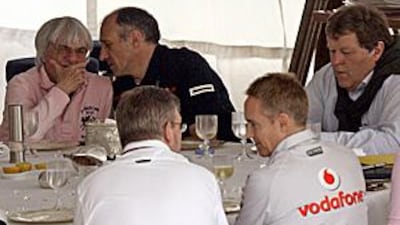The future of Formula One will become a lot clearer today when the Federation Internationale de l'Automobile (FIA) announce the entry list for next year's world championship. It is unlikely to be clear right up until the announcement in Paris, with a meeting taking place last night between the FIA president Max Mosley and the members ofFormula One Teams' Association (FOTA) in London, as to whether it will be the current 10 teams, plus three new entries, or whether there will be an exodus from the sport with new arrivals filling the grid.
Recent weeks have been dominated by debate and rows as controversial proposed regulations for the 2010 season have left the majority of the teams now competing in the series threatening to withdraw after this year's finale in Abu Dhabi on Nov 1, meaning the Yas Marina track could be playing host to the last Formula One race in its current form. At the crux of the matter is whether the current teams - including Ferrari, McLaren, Renault and BMW - accept regulations for next season that will see, as things stand, an optional budget cap of £40million (Dh241m) brought into the sport - designed to cut costs and also to encourage more participants with only 20 cars currently racing.
The catalyst for the drama was arguably the announcement by Honda in December that they were pulling out of Formula One with immediate effect, blaming the credit crunch for their wish to abandon a project with a reported budget of £182m a year, which the Japanese firm felt was hard to justify in the global economic crisis. There had been talk of budget caps in the past from Mosley, but when the FIA announced the move, that will incorporate a team's expenses apart from driver salaries, marketing and hospitality expenses in the £40m, it angered FOTA.
What has upset the teams is the fact that they would be heavily penalised if they decided not to go with the budget cap. Those who agreed to work within the cap would be allowed unlimited testing as well as more technical freedom to develop their chassis during the campaign. For any team that decided to race but work outside of the optional budget restriction the consequences would be severe. The testing and technical incentives would not be available to them and they would be at a competitive disadvantage.
Unsurprisingly the teams with the bigger budgets feel they are being penalised for their monetary gains, and that in encouraging new teams to enter the sport, the FIA are doing so at the expense of the existing teams and manufacturers. A Ferrari statement said: "For the first time ever in F1, the 2010 season will see the introduction of two different sets of regulations based on arbitrary technical rules and economic parameters."
The prospect of a two-tier championship, with one set of cars working to one set of regulations, and others working to different rules, is one that does not appeal to anyone and would make for an unbalanced championship. Why would manufacturers pour millions into competing in the series only to be at a massive technical disadvantage, with the rules stacked against them? Throughout last month Renault, BMW, Red Bull and Ferrari announced their intention to withdraw from the sport.
Meetings at the last few races have failed to yield a breakthrough on the issue, despite the best efforts of Bernie Ecclestone, who is the chief executive of Formula One management, with the race drivers predictably backing their teams in the dispute. The teams did all put in conditional entries ahead of last month's entry deadline, but that was done on the understanding that the budget cap would be dropped and the teams "will be permitted to compete during the 2010 Formula One season on an identical regulatory basis".
FOTA wanted to be allowed to work with the FIA to come up with ways of reducing budgets without affecting the racing, ensuring a level playing field on the track. But that offer was initially rejected by Mosley, who told the teams if they didn't like the rules to go away and set-up their own series. The FIA president has since softened his stance and hinted to the teams the budget cap can be withdrawn, but only if they sign up unconditionally first.
He said in a letter to FOTA: "The simplest way to ensure that all entrants run under the same rules would be if everyone entered under the cost-cap rules as published and then all entrants co-operated to agree modifications to those rules which would make the proposition workable for all parties." It will not be until today that the world finds out if the offer to the teams of "sign first talk later" was accepted when the names of the 13 teams competing is revealed.
Ten teams from outside Formula One have registered interest in racing next year, and three of them will be selected to compete if the existing 10 all agree to continue. Williams and Force India have signed up unconditionally already, but it is what the other eight teams do that is of interest. If they do not sign then we are left with what will be effectively a new Formula One next year. But without big names such as Ferrari will the sport be as marketable to spectators and television stations?
A breakaway series has been mooted, but whether it is feasible for the teams to find circuits - Dubai has been mentioned as a possible venue - arrange rules and such before March of next year is questionable at best. Everything should become a lot more clearer after today's announcement. When the cars arrive it Abu Dhabi for the first time in late October ahead of the race on Nov 1 it will either be to celebrate the end of an exciting season, or to mark the end of the series in its current form.
gcaygill@thenational.ae

